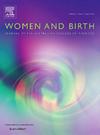Midwives' negative experiences and outcomes, a phenomenological study "Being a midwife in Istanbul; I am a midwife, I accompany births…, but I cannot be a midwife!"
IF 4.1
2区 医学
Q1 NURSING
引用次数: 0
Abstract
Problem and background
In Turkey, the fact that midwives cannot actively perform midwifery during births negatively affects them. Studies examining the negative experiences and outcomes of midwives are quite limited.
Aim
The study was conducted to examine the negative experiences and outcomes of midwives.
Method
The study was designed with phenomenological design, one of the qualitative research types. The participants consisted of 19 midwives selected by snowball sampling method. Semi-structured, face-to-face in-depth interviews were conducted with the participants. Interviews were audio recorded and transcribed. The data were analysed using an inductive qualitative content analysis approach. In the open coding process, expressions with similar meanings were identified and coded; these codes were divided into categories and subcategories according to their similarities and differences. Themes were formed in line with the relationships between categories.
Findings and results
The data obtained were grouped under three main themes. The themes were determined as "(I) negative experiences of midwives, (II) effects of midwives' negative experiences on their professional lives and (III) effects of midwives' negative experiences on their private lives. It was determined that midwives were exposed to mobbing and violence and had team problems. It was determined that they felt dissatisfied and disappointed as a result of the negative experiences they experienced. As a result, it was determined that midwives experienced burnout, secondary trauma, introversion and depression.
Suggestions
The sustainability of the midwifery workforce depends largely on improving their well-being and job satisfaction. This can be achieved by creating a positive working environment and implementing practical, long-term solutions. Supporting and advocating for midwives in the workplace by their managers can reduce burnout and dissatisfaction. Improving working conditions; reducing working hours, eliminating staff shortages, increasing wages, ensuring a balanced distribution of work intensity will reduce the intra-team conflict and tension experienced by midwives in their working environment.
助产士的负面经历和结果,现象学研究“伊斯坦布尔的助产士;我是一名助产士,我陪伴分娩……但我不能成为助产士!”
问题和背景在土耳其,助产士在分娩过程中不能积极助产的事实对她们产生了负面影响。研究助产士的负面经历和结果是相当有限的。目的本研究旨在探讨助产士的负面经历及其结果。方法采用质性研究类型之一的现象学设计。研究对象为采用滚雪球抽样法抽取的19名助产士。对参与者进行了半结构化的面对面深度访谈。采访录音和文字记录。数据分析采用归纳定性内容分析方法。在开放编码过程中,对含义相近的表达式进行识别编码;根据这些代码的异同,将其分为大类和亚类。主题是根据类别之间的关系形成的。所获得的数据分为三个主题。主题确定为“(I)助产士的负面经历,(II)助产士的负面经历对其职业生活的影响,(III)助产士的负面经历对其私人生活的影响。”据确定,助产士面临着围攻和暴力,并且存在团队问题。据确定,由于他们所经历的负面经历,他们感到不满和失望。因此,确定助产士经历了倦怠,继发性创伤,内向和抑郁。建议助产人员队伍的可持续性很大程度上取决于提高他们的幸福感和工作满意度。这可以通过创造一个积极的工作环境和实施切实可行的长期解决方案来实现。管理者在工作场所支持和倡导助产士可以减少倦怠和不满。改善工作条件;减少工作时间,消除人员短缺,增加工资,确保工作强度的平衡分配,将减少助产士在工作环境中经历的团队内部冲突和紧张。
本文章由计算机程序翻译,如有差异,请以英文原文为准。
求助全文
约1分钟内获得全文
求助全文
来源期刊

Women and Birth
NURSING-OBSTETRICS & GYNECOLOGY
CiteScore
7.20
自引率
13.20%
发文量
371
审稿时长
27 days
期刊介绍:
Women and Birth is the official journal of the Australian College of Midwives (ACM). It is a midwifery journal that publishes on all matters that affect women and birth, from pre-conceptual counselling, through pregnancy, birth, and the first six weeks postnatal. All papers accepted will draw from and contribute to the relevant contemporary research, policy and/or theoretical literature. We seek research papers, quality assurances papers (with ethical approval) discussion papers, clinical practice papers, case studies and original literature reviews.
Our women-centred focus is inclusive of the family, fetus and newborn, both well and sick, and covers both healthy and complex pregnancies and births. The journal seeks papers that take a woman-centred focus on maternity services, epidemiology, primary health care, reproductive psycho/physiology, midwifery practice, theory, research, education, management and leadership. We also seek relevant papers on maternal mental health and neonatal well-being, natural and complementary therapies, local, national and international policy, management, politics, economics and societal and cultural issues as they affect childbearing women and their families. Topics may include, where appropriate, neonatal care, child and family health, women’s health, related to pregnancy, birth and the postpartum, including lactation. Interprofessional papers relevant to midwifery are welcome. Articles are double blind peer-reviewed, primarily by experts in the field of the submitted work.
 求助内容:
求助内容: 应助结果提醒方式:
应助结果提醒方式:


